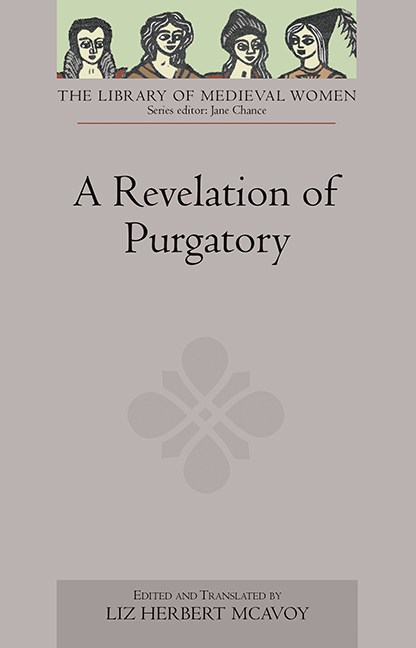Introduction
Published online by Cambridge University Press: 07 May 2022
Summary
A Revelation of Purgatory is a fifteenth-century prose text, internally dated to 1422. It claims to have been authored by a woman who was also an anchoress, although she never gives us her name. Originating in the form of a letter, the text documents a series of dream-visions received by the writer over the course of three nights, in which she is visited from purgatory by the soul of a dead friend, formerly a nun named Margaret. During these visions, the revenant presents the author with an uncompromising view of purgatorial suffering, both her own and those who suffer with her, and pleads with her former friend to help alleviate her misery.
This highly visual and dynamic text is placed neatly between the work of those two other late medieval women writers who are, perhaps, better known to us: Julian of Norwich (d. after 1416) and Margery Kempe (d. after 1438), the work of whom has now virtually attained canonical status. In contrast, A Revelation has been largely overlooked as a text able to tell us a great deal not only about late medieval English purgatorial piety but also about the central role played by female religiosity within that complex arena. The reasons for this lack of attention are multiple and complex, no doubt hinging on the text's anonymity and deceptive simplicity when viewed through a post- Enlightenment lens, where the ‘cult of the author’ (more explicitly, the cult of the male author) has long dominated the reception of the literary text. Implicated here too are A Revelation's generic characteristics, in which theological ‘truths’ are articulated via a narrative of the suffering body-in-pain, vivid corporeal dismemberment, invasion and an unmitigated torment in the afterlife that likely proved distasteful to later scholarly sensibilities. Such distaste was driven, in part, by a post-Enlightenment, Protestant-led resistance to the concept of universal pain and bodily spectacle after death as vehicles for ultimate human transcension. As Richard Fenn has argued, the concept of purgatory became subject to an inexorable ‘secularization’ in which
Christians were not to be open to spiritual infusions from the past and the future; they were to live out their lives in duration, in the protracted mean-time in which penitence and salvation are very much a matter of mundane, everyday life.
- Type
- Chapter
- Information
- A Revelation of Purgatory , pp. 1 - 70Publisher: Boydell & BrewerPrint publication year: 2017

